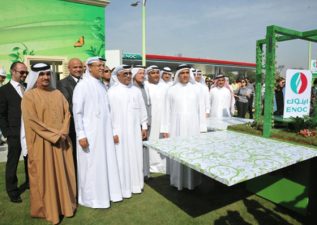
Mebiol’s hydrogel could make deserts flourish with crops grown on barren sand.
Here’s another futuristic invention that could completely change the future of agriculture in a desertifying world. Substituting an industrially produced hydrogel for soil makes it possible to farm on sterile desert sand. Similarly to Pink LEDs Grow Future Food with 90% Less Water, this amazing sci fi technology allows the farming of the desert, with 80 percent less water than needed in traditional farming.
The hydrogel technology is the invention of Waseda University Visiting Professor Yuichi Mori, who has years of experience in developing polymeric membranes for use in medical technologies such as blood purification and oxygen enrichment.
But Mori saw the greatest need was in desert farming in a future world faced with explosive population growth, but diminishing potential for traditional soil-based agriculture due to soil degradation, erosion, and drought.
His hydrogel membrane–based plant cultivation technology has a unique membrane technology [PDF]. The simple system is much more portable than traditional hydroponics.
Mori has launched a company, Mebiol, to commercialize the technology, which solves many of the farming problems found in deserts, the age-old agricultural problems due to the unpredictability of water supplies.

The plants grow on a thin hydrophilic film made of hydrogel, which allows the passage of water and nutrients such as various ions, amino acids and sugars but not bacteria, fungi and viruses. This protects plants from diseases; use of pesticide is minimized.
The membrane looks like a plastic sheet allows for no-soil and low-soil farming, with the water and fertilizer separate from the plants roots. The roots remain dry while drawing water and nutrients from below the membrane, and oxygen from the air. Lettuce and other leaf vegetables can be grown with no soil.
Hydrogels are networks of hydrophilic (which means “water-loving”) polymer chains, sometimes found as a colloidal gel in which water is the dispersion medium. The hydrogel membrane in the Imec technology is only microns thick.
Mebiol is the first and only company globally to have commercialized this kind of membrane for plant cultivation. Advanced membrane technologies are used in the medical and water purification field, but not in agriculture.
Other formulations of hydrogels have uses in medical treatment for blood purification and oxygen enrichment, and in water treatment for desalination and purification.
In agriculture use, along with eliminating the soil contamination that affects productivity and the quality of crops, one of the interesting side effects is that the plants synthesize a lot of sugar. The “water stress” the Imec membrane creates induces crops like tomatoes to synthesize large amounts of sugar, lycopene and other beneficial elements, leading to greater sweetness and higher nutritional value.
After testing the technology successfully in Dubai, one of the world’s most inhospitable environments for agriculture, the Sahara could be next.
And once he makes the desert bloom, Dr Mori believes that even less likely conditions could be roped in for producing crops for a rapidly growing world population.
The technology will even allow cultivation on ice – or concrete!
Read more on growing in desert climates:



Great idea. Hydrogel is silicon (found naturally as sand) made into filaments held together by a polymer. Making hydrogel out of a biodegradable polymer would make it 100% biodegradable. More research needs to be done about a desert climate but this could definitely help prevent disease in plant life!
And what happens to this hydrogel film, plastic looking membrane at end of its lifecycle? How long does it last? And is it biodegradable so that it does not to the plastic waste already inundating our planet? How will be it disposed of?
I want some for my window boxes!
well, soil degradation, erosion and drought happens because conventional farms depleted organic matter in the soil. Organic farming does not cause these problems, and sustains soil fertility over the long term. Replenishing organic matter, which has high water retention, in desert land is the way to hold on to water in the soil. There is no shortage of organic matter if we properly recycle our organic waste. Modernized organic farms that serve as sinks for processed organic waste, sound like the sustainable way of growing food in the desert.
Yes most of the brands do give out samples of their products. Look for “Official Samples” online and get the samples. They are the best. You wont need CC.